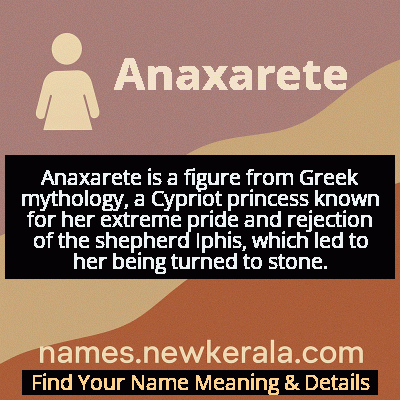Anaxarete Name Meaning & Details
Origin, Popularity, Numerology Analysis & Name Meaning of Anaxarete
Discover the origin, meaning, and cultural significance of the name ANAXARETE. Delve into its historical roots and explore the lasting impact it has had on communities and traditions.
Name
Anaxarete
Gender
Female
Origin
Greek
Lucky Number
8
Meaning of the Name - Anaxarete
Anaxarete is a figure from Greek mythology, a Cypriot princess known for her extreme pride and rejection of the shepherd Iphis, which led to her being turned to stone.
Anaxarete - Complete Numerology Analysis
Your Numerology Number
Based on Pythagorean Numerology System
Ruling Planet
Saturn
Positive Nature
Ambitious, efficient, realistic, and authoritative.
Negative Traits
Materialistic, stressed, confrontational, and can be overly ambitious.
Lucky Colours
Dark blue, black.
Lucky Days
Saturday.
Lucky Stones
Blue sapphire, amethyst.
Harmony Numbers
2, 4, 6.
Best Suited Professions
Business leaders, managers, financial services, law enforcement.
What People Like About You
Leadership, determination, organizational skills.
Famous People Named Anaxarete
Anaxarete of Cyprus
Mythological Figure
Legendary princess who rejected Iphis' love and was turned to stone by Aphrodite
Anaxarete (Ovid's Character)
Literary Character
Central figure in one of Ovid's most memorable transformation myths
Anaxarete in Renaissance Art
Artistic Subject
Inspired numerous artworks exploring themes of pride and punishment
Name Variations & International Equivalents
Click on blue names to explore their detailed meanings. Gray names with will be available soon.
Cultural & Historical Significance
During the Renaissance, Anaxarete's story experienced a revival as artists and writers rediscovered classical texts. Her transformation scene became particularly popular in visual arts, serving as a dramatic subject for exploring human emotion and divine intervention. The myth's themes resonated with Christian morality about pride and compassion, allowing for easy adaptation into Renaissance moral frameworks. In modern times, Anaxarete has become a psychological archetype, representing the dangers of emotional isolation and the human capacity for both great strength and profound vulnerability.
Extended Personality Analysis
The personality traits associated with Anaxarete are complex and deeply rooted in her mythological narrative. Primarily, she embodies extreme pride and emotional detachment—qualities that modern psychology might interpret as narcissistic traits or emotional armor. Her ability to remain unmoved by Iphis' declarations of love suggests remarkable self-control and emotional fortitude, but these strengths become fatal flaws when taken to extremes. The mythological context suggests someone who values independence and self-sufficiency above all else, potentially to the point of rejecting meaningful human connections.
Contemporary interpretations might view Anaxarete as representing the modern struggle between emotional vulnerability and self-protection. Her transformation into stone serves as a powerful metaphor for what happens when people build emotional walls too high—they become prisoners of their own defenses. However, the name also carries positive connotations of strength, resilience, and the ability to withstand pressure. Modern name psychology might suggest that someone named Anaxarete would possess strong leadership qualities, determination, and the capacity for profound personal transformation when they learn to balance strength with compassion.
Modern Usage & Popularity
Anaxarete remains one of the rarest names in modern usage, primarily confined to academic and literary contexts rather than practical naming. According to global name databases, there are virtually no recorded instances of children being named Anaxarete in the 21st century. The name's primary modern presence is in classical studies, where it appears in translations of Ovid and academic discussions of Greek mythology. Occasionally, it surfaces in fantasy literature or role-playing games as a character name representing cold, powerful female figures. The name's challenging pronunciation (an-ax-AR-e-tee) and strong negative mythological associations have prevented widespread adoption. However, among classical scholars and mythology enthusiasts, the name maintains a certain appeal for its historical significance and dramatic backstory. Current naming trends favoring unique mythological names have not significantly impacted Anaxarete's usage, likely due to the overwhelmingly negative connotations of the original myth.
Symbolic & Spiritual Meanings
Anaxarete symbolizes the profound psychological truth that emotional walls, while protective, can ultimately become prisons. Her transformation into stone represents the literal manifestation of emotional petrification—the process by which feelings become frozen and inaccessible. The name carries deep metaphorical meaning about the balance between strength and vulnerability, suggesting that true resilience requires the capacity for both. Symbolically, Anaxarete represents the danger of taking self-sufficiency to extremes, where independence becomes isolation and strength becomes rigidity.
The myth also symbolizes the ancient Greek concept of divine justice, where actions inevitably attract corresponding consequences. Anaxarete's punishment—being turned to stone while watching Iphis' funeral—represents poetic justice at its most precise: she becomes what she has made herself emotionally. In modern symbolic interpretation, Anaxarete serves as a warning about the importance of maintaining emotional flexibility and the dangers of allowing pride to override compassion. The name has come to represent the archetype of the 'ice queen' in psychological terms, symbolizing the tragic consequences when people become so defended that they can no longer experience genuine human connection.

